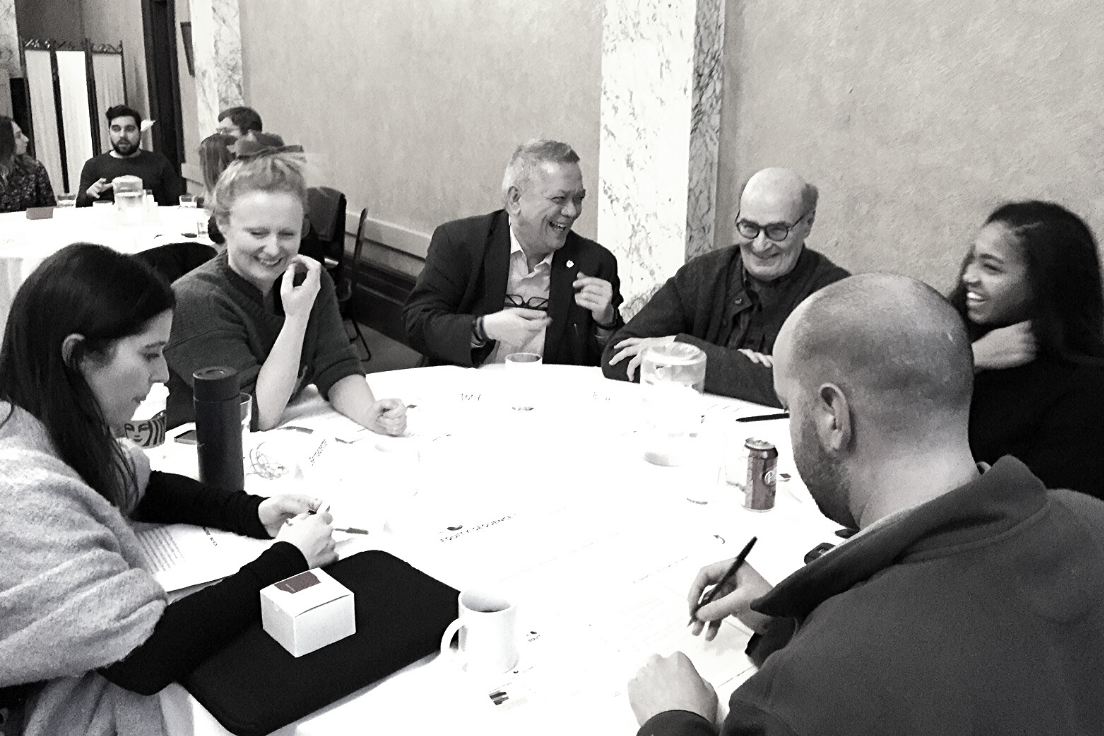What do you do once you decide to lead your sector toward greater equality?
In the lead up to the Imagine Canada bi-annual retreat scheduled for January 2020, Imagine Canada team members reflected that it was time to bring a more deliberate conversation around bias to the table, and so this important topic was put on the agenda.
Team members responsible for organizing the dialogue and sessions for the retreat went looking to find a relevant bias training program and provider, to help Imagine Canada tackle bias and related issues.
What if bias training isn’t a silver bullet?
It was Danielle Ferguson-Shivrattan, Coordinator, Executive Engagement who invited our team at Tidal Equality to deliver a session on bias at their retreat. Except our session isn’t called Bias Training. In fact, we sometimes refer to it cheekily as Not Unconscious Bias Training.
As we explained to Danielle, bias training - often positioned as a silver bullet or at least as a necessary first step towards equity, diversity, and inclusion - is problematic at best, and can even be harmful. We pointed her to the fact that more than 50 years of data on bias training reveals it has no effectiveness at creating more equity-minded individuals or equitable organizations.
Why do organizations do so much of it then? That’s a story for another time. It’s complex, and it’s political, but ultimately, the problem of ineffective bias training prompted our team at Tidal Equality to design a data-backed intervention that might match the features of bias training (in terms of cost, session length, etc.), but that would actually help an organization or team build equity, collaboratively, one decision and question at a time.
Tidal Equality teaches the Equity Sequence™
So, on a cold Toronto day, the Imagine Canada team gathered for their bi-annual retreat. Staff were excited to come together for a rare opportunity for the entire team to take a time-out from day-to-day imperatives and to collectively focus on the bigger-picture issues affecting all of Imagine’s teams, and of course, on themes affecting the charitable sector writ large.
Before the session took place, our team wanted to better understand Imagine Canada team members’ perspectives on why now is the time to be tackling issues of equality and bias head-on. We heard a lot of compelling motivations. And we did so using a really neat technical tool that allows participants to start collaborating on these issues before we even get into the room. Here’s what we heard:
“With what we’ve been seeing in the world the last few years..it’s a good time to make sure that in our own little way we’re not adding to the problem.”
“We’re at a pivotal moment where we’re asking questions about the breadth of organizations/sector professionals that we serve and where there may be gaps.”
“Our organization has gone through a lot of change in the past year, and it is important to invest in equity & equality to ensure we are making progress in these areas together.”
Imagine Canada’s Equity Sequence™ session was designed with insights like these, and other perspectives on the equity imperative, in mind.

Imagine Canada staff putting the Equity Sequence™ to action at the January 2020 retreat.
So, what is the Equity Sequence™?
Our team at Tidal Equality developed this unique, evidence-based alternative for busting bias and inequity, on the back of several years of in-depth research and practice leading a new wave of equity, diversity, and inclusion work. Our work at Tidal Equality has always been more about systemic interventions than individualized ones.
The Equity Sequence™ is designed to help any organization build equity - and ultimately, equality - one question and decision at a time.
Participants at the Imagine Canada session began by connecting to the compelling reasons, both human and organizational, to advance equality, diversity, and inclusion in their context. Then they learned the Equity Sequence™ and practiced applying it collectively to the relevant and customized case studies we had created for them. They had collaborative, effective, and engaging conversations about building equity, while applying their learnings to these real-life scenarios.
By the end of the session, participants identified exciting real-world opportunities to apply the Equity Sequence™ to their work, and made commitments to apply it to contexts including:
- Committee work
- Annual marketing planning
- Policy research processes
- Social media content planning
- Event planning
- Project planning meetings
- Annual performance development processes
- And many more...
How does Imagine Canada imagine the impact?
After the session, we connected with participants, including Imagine Canada’s President and CEO, Bruce MacDonald, to hear their thoughts on the value of the Equity Sequence™ and on the impact it could have on their work and on Imagine Canada, more broadly.
QUESTION: In your perspective, what value do you believe the session and the Equity Sequence™ offers Imagine Canada?
ANSWER: The session taught us a practical tool that can be used across the entire organization. Staff from any level, any department, and any project can easily utilize the Equity Sequence to ensure we are being as fair and transparent as possible. While it would ideally be used at the very beginning of planning any initiative, it can also be introduced at any time (better late than never) to make course adjustments and improvements.
- Danielle Ferguson-Shivrattan, Coordinator, Executive Engagement, Imagine Canada
QUESTION: Thinking beyond Imagine Canada, can you describe how you imagine the Equity Sequence™ could impact your broader community, your city, province, country, sector, and beyond, if it were applied widely and consistently?
ANSWER: More broadly, the equity sequence (especially in its simplicity to grasp and apply) could definitely be more widely used within the Toronto community or Canadian community more broadly. If people were more conscious of asking these types of questions when tackling any project, issue, task - our society would be a lot more equitable.
- Anonymous response
QUESTION: Reflecting on the session, can you describe what it meant to you, personally?
ANSWER: For me personally, this session really helped to find that balance between intention and structure. We often talk about wanting to do things in a particular way, but the realities of busy work kick in and we simply replicate our previous patterns. With the Equity Sequence™, we can translate that intention into real change by applying the questions in a thoughtful way. The impact of this will be long-term and widespread.
- Bruce MacDonald, President & CEO, Imagine Canada
A shared vision for the future
At Tidal Equality, we envision a world where equality is the new status quo and all people can achieve their full potential, and the Equity Sequence™ is our contribution to that vision.
Imagine Canada’s mandate aligns with this vision, as they work to “strengthen Canadian charities and nonprofits so they can better serve individuals and communities both here and around the world.”
If you are leading or working in a charitable organization or social purpose business, and you’d like to learn how the Equity Sequence™ can equip your people to design greater equity one decision and one question at a time, we want to hear from you! Reach us at [email protected].



